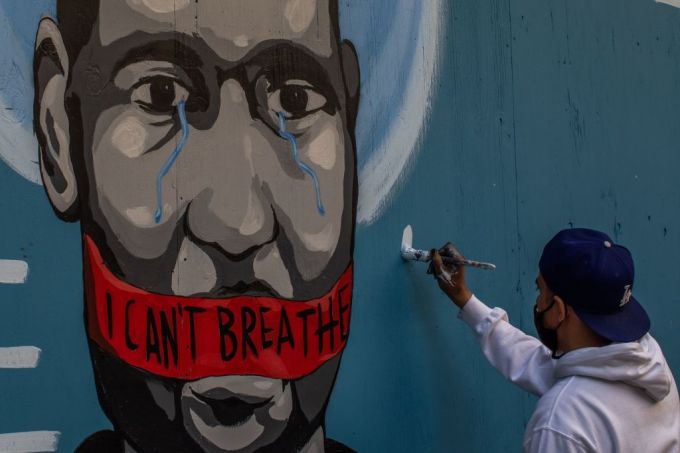Hey, y’all. I’m experimenting with a bi-weekly roundup that looks at the state of labor in tech.
We’ll use this space to explore topics related to diversity, equity and inclusion, the future of work, issues relating to pay equality, notable personnel changes and much more.
This week, we’re looking at Facebook’s civil rights audit, a new gig worker earnings study, the latest on California ballot measure Proposition 22 and layoffs amid COVID-19.
Stay woke

The artist Celos paints a mural in downtown Los Angeles on May 30, 2020 in protest against the death of George Floyd, an unarmed black man who died while being arrested and pinned to the ground by the knee of a Minneapolis police officer. (Photo by APU GOMES/AFP via Getty Images)
It’s been less than two months since the police killing of George Floyd. While the tech industry has continued on with its funding rounds, mergers and acquisitions, there is still work to be done on the racial justice front. Here’s a look at some developments over the last couple of weeks.
Facebook’s civil rights audit highlights gaps in DE&I work
As seen in Facebook’s final civil rights audit report conducted by former ACLU attorney Laura Murphy, the social networking giant still must do more to increase diversity in its senior leadership roles and C-suite. These roles for Black, indigenous and people of color must also not be “limited to diversity officer positions as is often the case in corporate America,” the report states.
According to the audit, there must also be company-wide recognition that diversity, equity and inclusion efforts are not to fall solely on those in underrepresented groups, but rather on all members of the senior leadership team and managers. The audit also highlighted employee concerns around “a lack of recognition for the time URM employees spend mentoring and recruiting other minorities to work at Facebook.”
Here’s a key nugget that speaks to the importance of not solely relying on everyday BIPOC employees to do DEI work:
That said, having people of color in leadership roles is not the same as having people who have been deeply educated and experienced in understanding civil rights law and policy. People of color and civil rights expertise are not interchangeable. Treating them as such risks both reducing people of color to one-dimensional representatives of their race or national origin and unfairly saddling them with the responsibility, burden, and emotional labor of identifying civil rights concerns and advocating internally for them to be addressed.
Murphy and her team recognized some of the progress Facebook has made recently, giving the company kudos for elevating the role of Maxine Williams, the company’s chief diversity officer. In June, Williams began reporting directly to Facebook COO Sheryl Sandberg and sitting in on team meetings led by either CEO Mark Zuckerberg or Sandberg.
However, diversity advocates for years have been calling for heads of diversity to report directly to the CEO. Many companies, however, have yet to do that. More often, tech companies have people in these roles report directly to their heads of HR.
Additionally, Facebook has committed to spend at least $1 billion with diverse suppliers beginning next year and all subsequent years, and at least $100 million annually, specifically with Black-owned suppliers.
By the end of 2023, Facebook has committed to having 50% of its workforce be members of underrepresented groups, which includes BIPOC, women, disabled people and veterans. Over the next five years, Facebook said it’s committed to increasing its Black employee base by 30%; currently 3.8% of its U.S.-based employees are Black.
Gig life
The COVID-19 pandemic has highlighted many of the struggles gig workers have faced for years. In the last few months, we’ve seen these workers demand basic personal protective equipment from Uber, Lyft, Shipt and others, and request that those companies abide by AB 5 in California by making them employees, rather than independent contractors.
This is the latest:
Driver earnings study shows median driver earns $23.25/hour in Seattle
A new Cornell study dropped this week looking at Uber and Lyft driver wages in Seattle.
After expenses, the median driver earned $23.25 per hour and 92% of drivers made more than the Seattle minimum wage of $16.39, after expenses. The study looked at ride records provided by both Uber and Lyft over the course of one week.
“For most drivers, platform driving is a side job, with hourly earnings, while not stellar are about average for Seattle — and above average for comparable service-economy jobs,” the study states. “We acknowledge, however, that our approach through much of this report, does not take into account any return to drivers, their returns to capital, for providing use of their cars in addition to driving services (though we do account for drivers’ costs).”
Prop 22 takes hold
The gig worker ballot initiative funded by Uber, Lyft, DoorDash and Instacart received its proposition number. Now known as Prop 22, the measure aims to keep gig workers classified as independent contractors. The measure, if passed, would make drivers and delivery workers for said companies exempt from a new state law that classifies them as W-2 employees.
However, a report conducted by the Partnership for Working Families argues voting yes on Prop 22 would “create a permanent underclass of workers in a growing sector of the economy.”
The economic fallout of COVID-19
Around the time when shelter-in-place orders went into effect, it felt like there were reports of massive layoffs at tech companies at least once a day. Since March, more than 70,000 tech startup employees have lost jobs, according to brokerage BuyShares.co.uk.
Many big companies, which not too recently felt untouchable, let go of notable chunks of their workforce. Uber, for example, has laid off thousands of employees, which effectively shrunk its workforce by 25%. Bird also let go of 30% of its workforce amid the pandemic.
